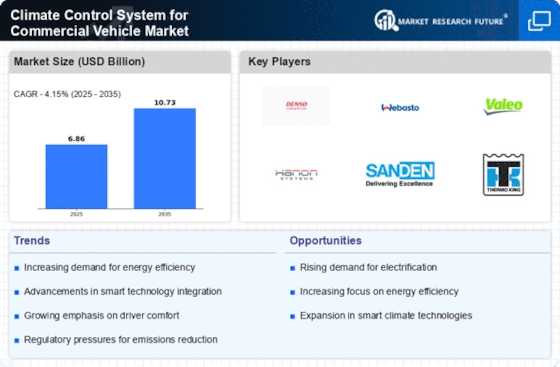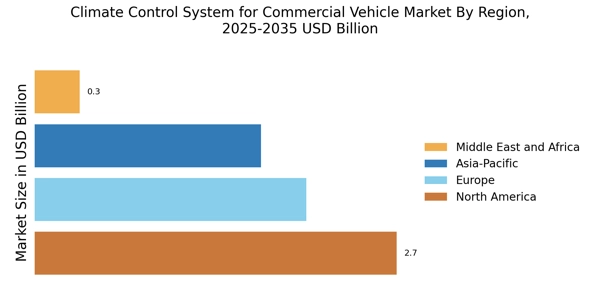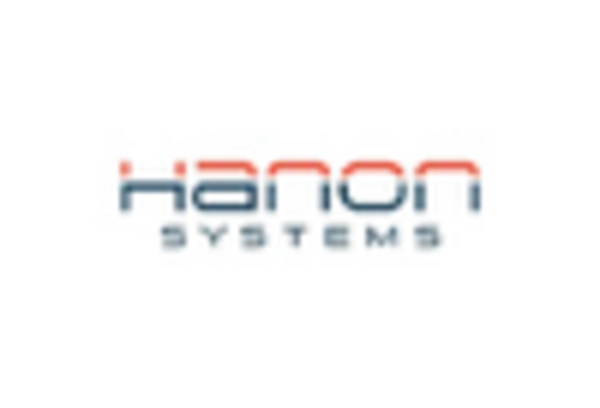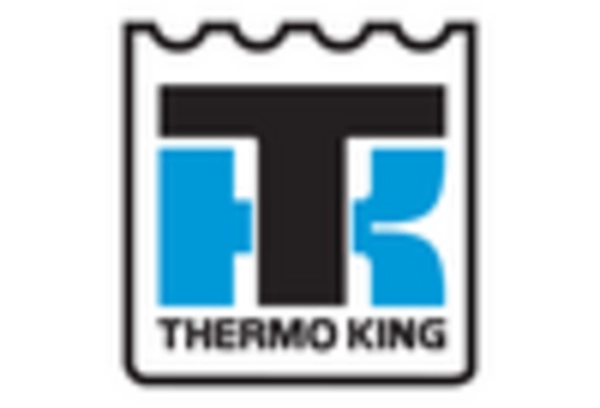Rising Demand for Enhanced Comfort
The Climate Control System for Commercial Vehicle Market experiences a notable surge in demand for enhanced comfort features. As commercial vehicles are increasingly utilized for long-haul transportation, the need for effective climate control systems becomes paramount. Drivers and passengers alike expect a comfortable environment, which directly influences productivity and satisfaction. According to recent data, the market for climate control systems is projected to grow at a compound annual growth rate of approximately 5.2% over the next five years. This growth is driven by the necessity for improved air quality and temperature regulation within commercial vehicles, thereby enhancing the overall driving experience.
Increasing Urbanization and Logistics Demand
The Climate Control System for Commercial Vehicle Market is also impacted by the increasing urbanization and the corresponding demand for logistics services. As urban areas expand, the need for efficient transportation solutions rises, leading to a higher demand for commercial vehicles equipped with effective climate control systems. The logistics sector is projected to grow at a rate of 6% annually, necessitating the integration of advanced climate control technologies to ensure optimal performance in varying environmental conditions. This trend highlights the importance of climate control systems in maintaining operational efficiency and reliability in urban logistics.
Technological Advancements in Climate Control
Technological advancements play a crucial role in shaping the Climate Control System for Commercial Vehicle Market. Innovations such as automatic climate control, advanced sensors, and IoT integration are becoming increasingly prevalent. These technologies not only improve the efficiency of climate control systems but also contribute to energy savings and reduced emissions. The integration of smart technologies is expected to drive market growth, with estimates suggesting that the adoption of such systems could increase by 30% in the next few years. This trend indicates a shift towards more intelligent and responsive climate control solutions in commercial vehicles.
Emphasis on Fuel Efficiency and Sustainability
The Climate Control System for Commercial Vehicle Market is significantly influenced by the growing emphasis on fuel efficiency and sustainability. As environmental regulations become more stringent, manufacturers are compelled to develop climate control systems that minimize energy consumption and reduce carbon footprints. The market is witnessing a shift towards eco-friendly refrigerants and energy-efficient designs. Reports indicate that vehicles equipped with advanced climate control systems can achieve up to 15% better fuel efficiency. This focus on sustainability not only meets regulatory requirements but also appeals to environmentally conscious consumers, thereby driving market growth.
Regulatory Standards and Compliance Requirements
Regulatory standards and compliance requirements are pivotal drivers in the Climate Control System for Commercial Vehicle Market. Governments worldwide are implementing stricter regulations regarding emissions and energy efficiency, compelling manufacturers to innovate and adapt their climate control systems accordingly. Compliance with these regulations not only ensures market access but also enhances brand reputation. The market is expected to see a rise in demand for systems that meet or exceed these standards, with projections indicating a 20% increase in compliance-driven purchases over the next few years. This regulatory landscape is shaping the future of climate control systems in commercial vehicles.


















